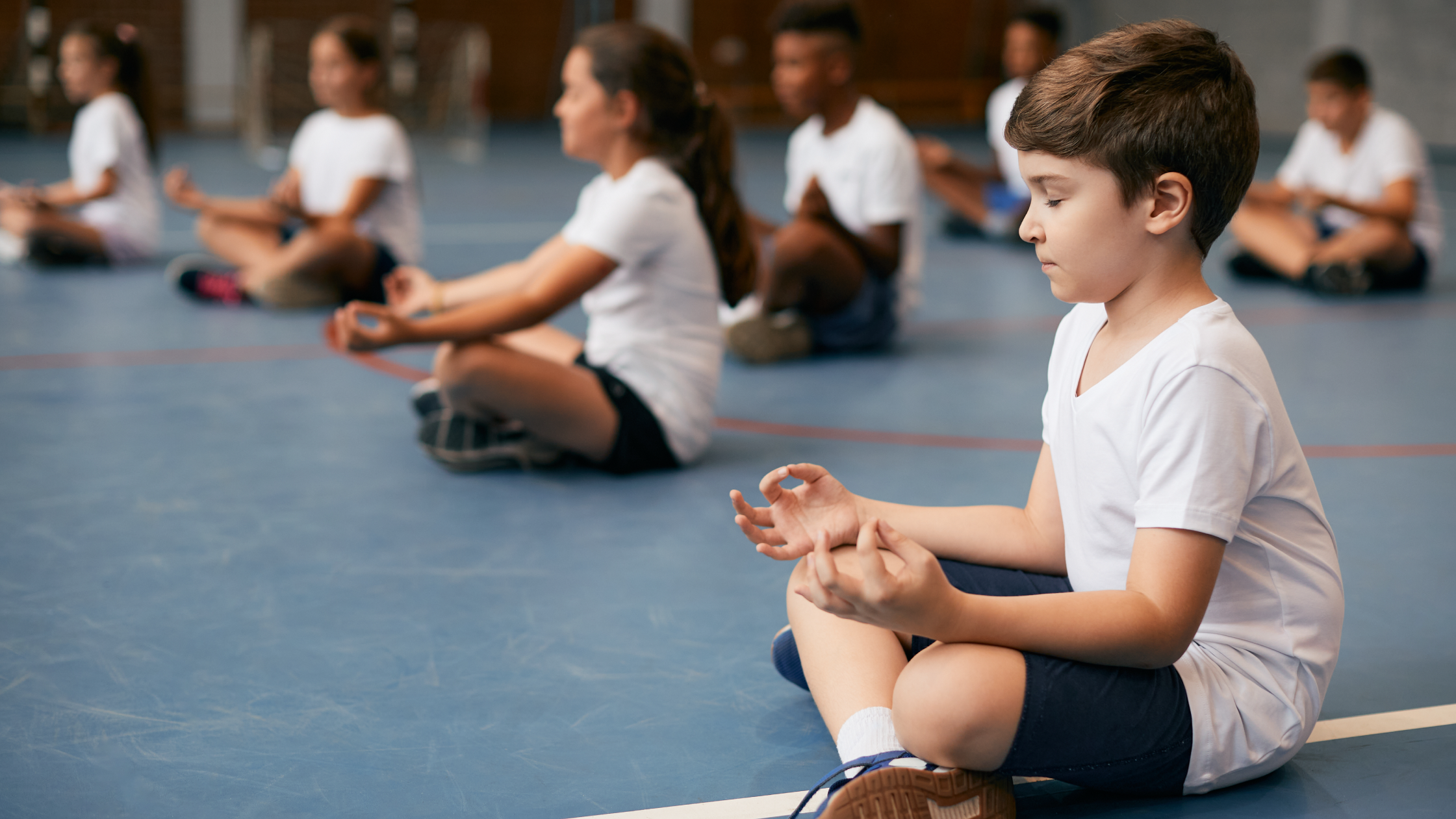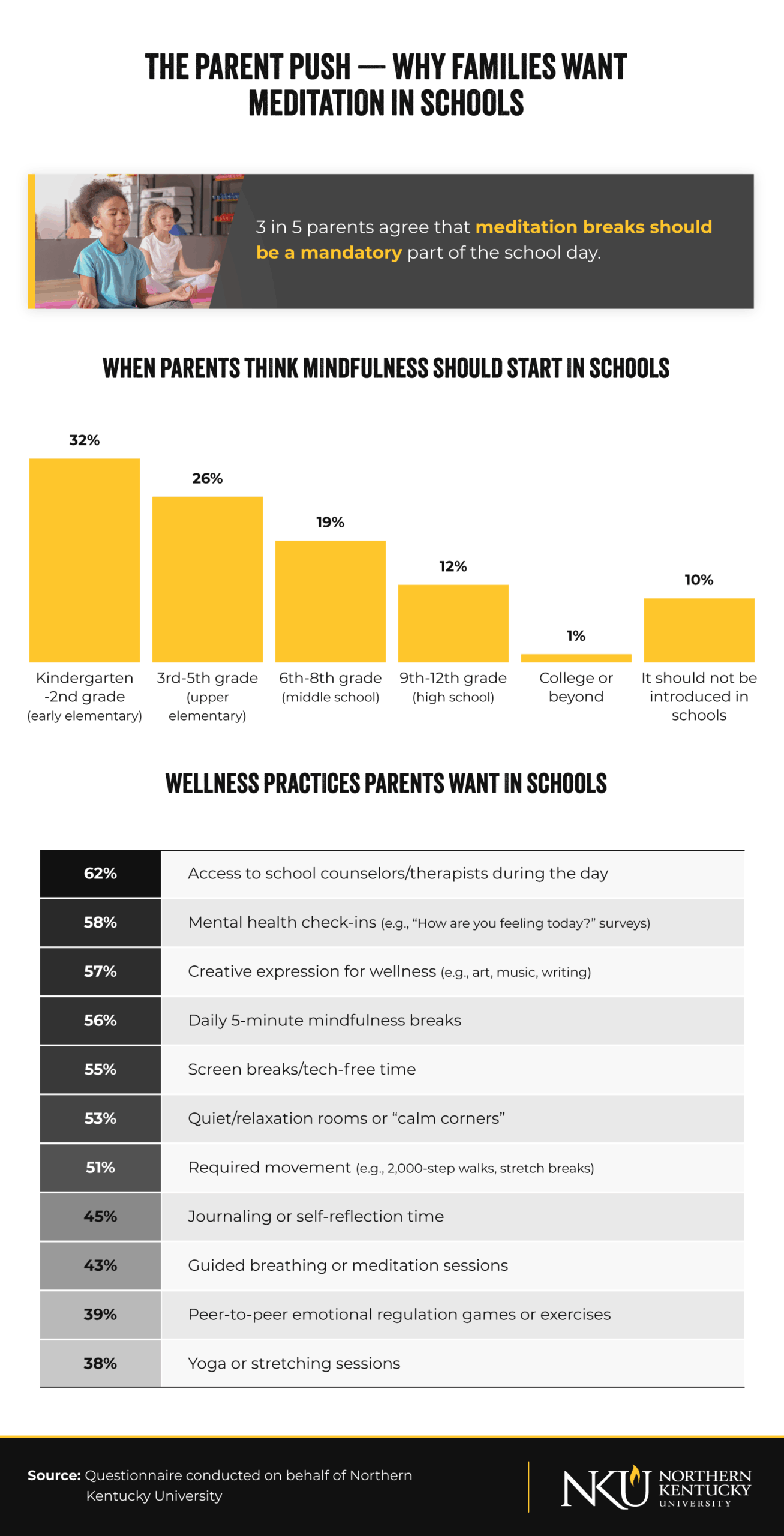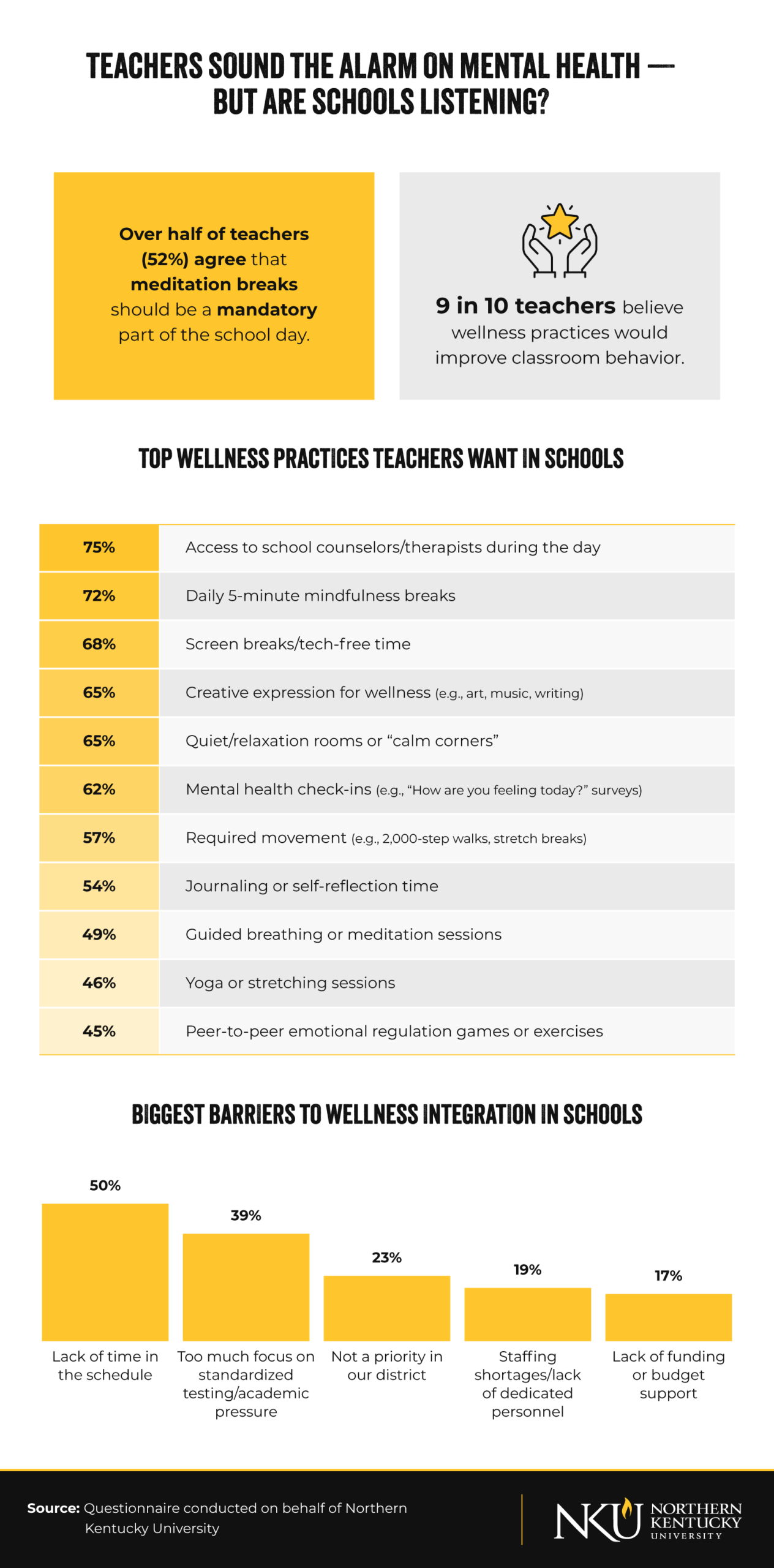
As student mental health continues to dominate national conversations, schools are increasingly being asked to do more than just teach academics. With rising concerns about stress, focus and emotional well-being among children, parents and teachers alike are considering whether practices like meditation should be built into the daily school routine. To better understand these perspectives, a questionnaire of parents and K-12 teachers across the U.S. was conducted on behalf of Northern Kentucky University.
The questionnaire was designed to explore how families and educators view meditation breaks, wellness initiatives and mindfulness programs in schools. Findings reveal both enthusiasm and challenges around implementation, offering valuable insight for those pursuing a degree in education. As tomorrow’s teachers and school leaders prepare to enter the classroom, understanding how wellness fits into the broader educational mission will be key to creating supportive, student-centered learning environments.
Key Takeaways
- Three in five parents agree that meditation breaks should be a mandatory part of the school day.
- Over half of teachers (52%) support mandatory meditation breaks.
- Nine in 10 teachers believe wellness would improve classroom behavior.
- Nearly one in three parents (32%) and about half of teachers (49%) think mindfulness should begin as early as kindergarten through 2nd grade.
- More than three in four parents (78%) and over four in five teachers believe schools should treat wellness practices as core subjects.
Parents Call for Early Mindfulness in Schools

- 60% of parents believe meditation should be mandatory during the school day, with 16% strongly agreeing.
- More than three in four parents (78%) said schools should treat emotional wellness as a core subject, with 41% strongly agreeing.
- Nearly one in three parents (32%) think schools should introduce mindfulness in kindergarten through 2nd grade, while smaller groups prefer starting later: 26% in grades 3 to 5, 19% in grades 6 to 8 and 12% in high school.
- Nearly half of parents (48%) believe their child’s mental health would worsen in the next five years without school intervention, while 19% thought it could improve even without changes.
- Parents have concerns about wellness programs, including that they might feel performative (31%), inappropriate in content (19%) or distract from academics (14%).
- Among parents whose children already participate in wellness activities at school, only 1 in 4 (25%) believe the programs are genuinely helpful, while 29% say they are well-intentioned but performative.
- Most parents (77%) believe wellness practices would increase their child’s enjoyment of school. While 82% encourage wellness activities at home, 14% admit they rarely do so.
Teachers Warn of Rising Mental Health Concerns

- Almost all teachers (96%) said they are concerned about student mental health, with nearly half reporting they are “very” or “extremely” concerned.
- Just over half (52%) support mandatory meditation breaks, including 18% who strongly agree.
- Nearly half (49%) said mindfulness should begin between kindergarten and 2nd grade, though 5% believe schools should not introduce it at all.
- Four in 10 teachers report having wellness programs in their schools. Of those, 54% consider them well-intentioned but mostly performative, while 24% find them genuine and effective.
- Many teachers are unaware of the recommended amount of physical activity students need: 44% said students should get fewer than 5,000 steps per day, and 33% chose 5,000-7,999 steps. Only 14% selected the ideal range of 10,000-12,999 steps.
- Teachers also identified barriers to wellness integration, including a lack of time in the schedule (50%), excessive focus on standardized testing (39%), inadequate district prioritization (23%), staffing shortages (19%) and limited funding (17%).
- More than two in three teachers (69%) believe student mental health would worsen over the next five years without intervention. Nine in 10 agree that wellness initiatives would improve classroom behavior.
Shared Goals and Different Priorities Among Parents and Teachers
- Parents and teachers largely agree on the benefits: 87% of teachers and 86% of parents said wellness would improve student focus. Nearly nine in 10 teachers (88%) and four in five parents (79%) said it would boost academic performance. Most also believe wellness would strengthen emotional regulation (94% of teachers, 85% of parents).
- Both groups support access to school counselors (75% of teachers, 62% of parents), screen breaks (68% of teachers, 56% of parents), creative outlets like art or journaling (65% of teachers, 58% of parents), and daily check-ins (62% of teachers, 60% of parents).
- Teachers are more likely than parents to support daily mindfulness breaks (72% vs. 56%), relaxation spaces (65% vs. 53%), peer regulation games (45% vs. 36%), and yoga or stretching sessions (46% vs. 39%).
- While 60% of parents and 52% of teachers support mandatory meditation breaks overall, 23% in each group oppose them. Of these, 15% somewhat disagree and 8% strongly disagree.
The Future of Wellness in Schools
The findings from this questionnaire show a growing consensus among parents and teachers that student wellness should play a stronger role in education. Many in both groups see clear benefits in focus, emotional regulation and academic performance, though opinions vary on how best to integrate these practices.
As conversations around student mental health continue, schools may need to balance academic priorities with wellness strategies that foster healthier learning environments. The data suggests that small steps, like meditation breaks, movement goals or mindfulness activities, could make a meaningful difference in shaping classroom culture for the better.
For those preparing to become teachers and school leaders, the findings highlight how wellness initiatives are becoming part of the broader expectations placed on educators. As the role of schools continues to expand, tomorrow’s educators will need the skills to balance academics with strategies that support students’ mental and emotional health.
Methodology
This report is based on a questionnaire of 503 parents and 500 educators across the U.S., conducted only on behalf of Northern Kentucky University from September 18-24, 2025. Respondents represented a range of grade levels, subjects, years of experience and geographic regions. The questionnaire aimed to determine whether parents and teachers believe wellness practices such as meditation, movement and mindfulness should be formally integrated into the K-12 school day and which specific strategies they feel could meaningfully improve student focus, emotional health and classroom culture.
While the findings provide valuable insight into current attitudes and perceived benefits, the sample size and self-reported nature of the survey limit broader generalizations. Results should be interpreted as directional, offering a timely snapshot to inform further study, policy development and professional training program design.
About Northern Kentucky University
Northern Kentucky University offers online degree programs designed for working professionals who want to advance their careers with flexible, affordable education. NKU’s online Master of Arts in Teaching (M.A.T.) programs are designed for individuals with a bachelor’s degree in a content area who aspire to be educators, preparing them to teach in areas such as special education P-12, middle grades education (grades 5-9), secondary education (grades 8-12) and P-12 education.
Fair Use Statement
Information in this article may be used for noncommercial purposes only. If you share this content, please provide a link back to NKU with proper attribution.